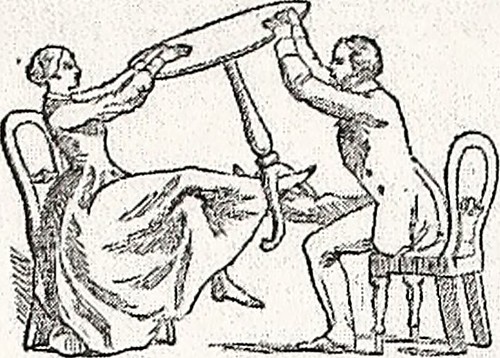I don't have the gift of speaking with the spirit world so I'd be unable to do that without some sleight of hand. Here's how I'd give people the impression that I can do it though - it's almost the same thing I think. Obviously this is a thought experiment and I won't actually tell people that I can talk to their departed loved ones as it seems cruel to do so if you can't actually do that.
1. Local and national newspapers' archives (online, libraries)
First, I'd find out who's died locally within the last year. Most towns have a local newspaper and their archive is online. I'd search the name of the city / town and add 'local paper' or 'local news' and see what comes up. Noting the web address(es) of local paper(s) I might expand the search with something like:
inurl:localnewspaper.co.uk died
or
inurl:localnewspaper.co.uk death - and you can use Google's search features to restrict to within a particular time period.
I might also just try the name of the town and 'died' and variants of that. And of course mainstream newspapers' obituaries (almost all online).
2. If you build it they will share their data with you
Probably I'd have already set up a Facebook page or Twitter feed so that people could tell me which shows they were coming to - a few scrolls through their profiles ('Facebook creeping') might tell me if they'd lost someone (or even if their friends had lost someone) and who that person was.
Someone on Twitter might have mentioned a few months ago something about someone they'd lost and that wouldn't show up on looking at their current profile, fortunately Twitter's advanced search lets you go back much further in someone's tweets.
I'd probably also have a sign-up form on my website with a field for people's postcode. That tells me their city and street, and in some cases narrows it down to a few houses so I can have a good idea of where they live and perhaps what amenities are nearby (perhaps a local church, might take a wander and look at the headstones if I'm in the area). Their email address might not be very instructive (gmail.com) but maybe they'll use a work email address so I'll know where they work. If I sold things on my website I'd have their bank information too, might be able to get further info from that.

3. Advanced trolling
There used to be a magazine psychic who asked readers to send in a photo, name, phone number and SAE (stamped addressed envelope). I wonder how many of the people writing in understood what information could be gleaned from that, though this was a few years ago in the earlier days of the internet when finding info out would have taken a different set of research skills.
Another person, Peter Popoff (an evangelical preacher / 'healer'), had a clever technique of (a) getting people to fill out prayer cards at his events with their name, address and afflictions and (b) getting his wife to communicate this to him by an in-ear microphone. Of course the audience at his shows didn't know about this in-ear microphone and believed that he was receiving this information through divine means.
4. Further reading
Techniques used by psychics include psychological tricks such as cold reading (making reasonable guesstimates about you from your appearance, and the things you say and contribute to the conversation) and hot reading (doing a background check on you, foreknowledge).
I might also familiarise myself with some examples of 'jigsaw identification' which shows how bits of information that are not obviously related can be used to triangulate other bits of information.
If I was doing a show on a nightly tour around the UK, I would find all of that far too much effort (especially if I was playing 25 cities a month). I wouldn't want a team of researchers, too risky if one of them grows a conscience. No, the only people aware of the lie should be me and maybe my spouse.
ReplyDeleteI work in professional theatre and I cannot imagine a situation where it would be worthwhile to have a radio link with a confident. The risks of being found out (think Mr. Popoff) and many local theatre staff being exposed to the "secret" each month, would make it (IMHO) not worth it on tour.
I would probably spin barnum statements, some cold reading (in an audience of a thousand someone will have lost a "John") and the occasional "sensational" reveal gleaned from a bit of Facebook and twitter stalking in the few hours leading up to the show.
I would rely on the incredulity of my audience and their willing suspension of disbelief to get away with this obvious charlatanism. Safe in the knowledge that no-one can prove that I am fraudulent so I issue legal threats to silence criticism.
Thanks George, great comment - I'd definitely want to avoid others dobbing me in so your strategy seems very wise.
Delete